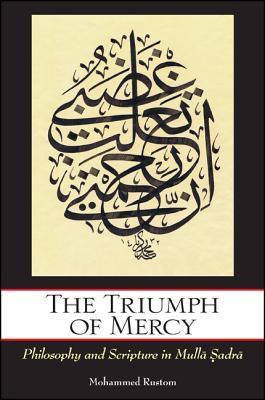-

A note on book covers: while we do our best to ensure the accuracy of cover images, ISBNs may at times be reused for different editions of the same title which may hence appear as a different cover.
The Triumph of Mercy: Philosophy and Scripture in Mullā Ṣadrā
The Triumph of Mercy: Philosophy and Scripture in Mullā Ṣadrā
Couldn't load pickup availability
This book investigates the convergence of philosophy, scriptural exegesis, and mysticism in the thought of the celebrated Islamic philosopher Mullā Ṣadrā (d. 1050/1640). Through a careful presentation of the theoretical and practical dimensions of Ṣadrā’s Qur'ānic hermeneutics, Mohammed Rustom highlights the manner in which Ṣadrā offers a penetrating metaphysical commentary upon the Fātiḥa, the chapter of the Qur'ān that occupies central importance in Muslim daily life. Engaging such medieval intellectual giants as Fakhr al-Dīn al-Rāzī (d. 606/1210) and Ibn 'Arabī (d. 638/1240) on the one hand, and the wider disciplines of philosophy, theology, Sufism, and Qur'ānic exegesis on the other, Ṣadrā’s commentary upon the Fātiḥa provides him with the opportunity to modify and recast many of his philosophical positions within a scripture-based framework. He thereby reveals himself to be a profound religious thinker who, among other things, argues for the salvation of all human beings in the afterlife.
“Informed, informative, and a superb example of seminal scholarship, The Triumph of Mercy is a highly recommended and core addition to academic library Islamic Studies and Philosophy Studies reference collections and supplemental reading lists.” — Midwest Book Review
“By focusing on Ṣadrā’s commentary on the Qur'ān’s opening chapter, Rustom shows how the great Iranian thinker created an original Qur'ānic hermeneutics as well as a new ontology of the Qur'ān. Rustom’s book is a groundbreaking and richly detailed study of the way that Ṣadrā both appropriated and transcended the Islamic traditions of theology, mysticism, philosophy, and scriptural exegesis.” — Robert Wisnovsky, author of Avicenna’s Metaphysics in Context
“Mohammed Rustom has opened the door to a remarkable philosophical exegesis of the Qur'ān in this pathbreaking study of the outstanding Iranian thinker of the seventeenth century, Mullā Ṣadrā. In the process, he clarifies the profound connections between philosophy, Sufism, and Islamic theology in Ṣadrā’s work. This absorbing study will be welcomed by anyone interested in the fundamental question of how reason interacts with revelation.” — Carl W. Ernst, author of How to Read the Qur'ā A New Guide, with Select Translations
“This first book-length survey of Mullā Ṣadrā’s Qur'ānic commentaries is a major contribution to the study of this seventeenth-century Muslim philosopher and to the field of philosophical exegesis in Islam. Mohammed Rustom presents Ṣadrā’s vision for the unity of the ‘intellectual’ and ‘transmitted’ sciences and gives us a complete picture of a first-rate thinker contemplating upon the Qur'ān. He does an excellent job of contextualizing Ṣadrā’s Qur'ānic hermeneutics within the framework of his ‘Transcendent Wisdom’ and shows how scriptural reasoning complements philosophical vision. Based on an in-depth reading and translation of Ṣadrā’s key texts on Qur'ānic exegesis, the book examines a much-neglected aspect of Ṣadrā’s thought and introduces the reader to the rich philosophical tapestry of the Islamic intellectual tradition.” — Ibrahim Kalin, author of Knowledge in Later Islamic Mullā Ṣadrā on Existence, Intellect, and Intuition
Details of Book
Related Collections:
A note on book covers: while we do our best to ensure the accuracy of cover images, ISBNs may at times be reused for different editions of the same title which may hence appear as a different cover.

-
One Line Summary
Explores Islamic philosophy and Qur'ānic mysticism in depth.
-
Who is this book for?
If you're curious about how Islamic philosophy and mystical teachings blend, this book is a treasure. It offers a deep dive into Mullā Ṣadrā's unique approach to interpreting the Qur'an, revealing a sophisticated fusion of reason, faith, and spirituality. Many readers find it enlightening and thought-provoking, especially if you're interested in the philosophical underpinnings of religious thought.

